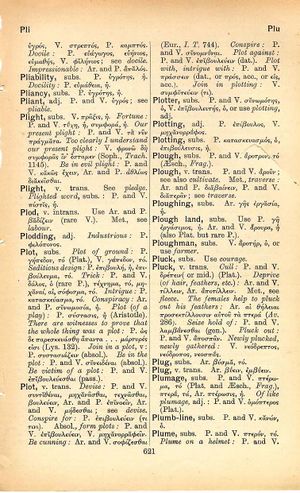plot: Difference between revisions
(CSV4) |
(nlel) |
||
| Line 20: | Line 20: | ||
<b class="b2">Plot with, intrigue with</b>: P. and V. πράσσειν (dat., or [[πρός]], acc., or εἰς, acc.). | <b class="b2">Plot with, intrigue with</b>: P. and V. πράσσειν (dat., or [[πρός]], acc., or εἰς, acc.). | ||
<b class="b2">Join in plotting</b>: V. συμφυτεύειν (τι). | <b class="b2">Join in plotting</b>: V. συμφυτεύειν (τι). | ||
}} | |||
{{nlel | |||
|nleltext=[[συσκευή]] | |||
}} | }} | ||
Revision as of 17:05, 9 January 2019
English > Greek (Woodhouse)
subs.
Plot of ground: P. γήπεδον, τό (Plat.), V. γάπεδον, τό. Seditious design: P. ἐπιβουλή, ἡ, ἐπιβούλευμα, τό. Trick: P. and V. δόλος, ὁ (rare P.), τέχνημα, τό, μηχαναί, αἱ, σόφισμα, τό. Intrigue: P. κατασκεύασμα, τό. Conspiracy: Ar. and P. συνωμοσία, ἡ. Plot (of a play): P. σύστασις, ἡ (Aristotle). There are witnesses to prove that the whole thing was a plot: P. ὡς δε παρεσκευάσθη ἅπαντα . . . μάρτυρές εἰσι (Lys. 132). Join in a plot, v: P. συστασιάζειν (absol.). Be in the plot: P. and V. συνειδέναι (absol.). Be victim of a plot: P. and V. ἐπιβουλεύεσθαι (pass.). v. trans. Devise: P. and V. συντιθέναι, μηχανᾶσθαι, τεχνᾶσθαι, βουλεύειν, Ar. and P. ἐπινοεῖν, Ar. and V. μήδεσθαι; see devise. Conspire for: P. ἐπιβουλεύειν (τι τινι). Absol., form plots: P. and V. ἐπιβουλεύειν, V. μηχανορραφεῖν. Be cunning: Ar. and V. σοφίζεσθαι (Eur., I T. 744). Conspire: P. and V. συνομνύναι. Plot against: P. and V. ἐπιβουλεύειν (dat.). Plot with, intrigue with: P. and V. πράσσειν (dat., or πρός, acc., or εἰς, acc.). Join in plotting: V. συμφυτεύειν (τι).

